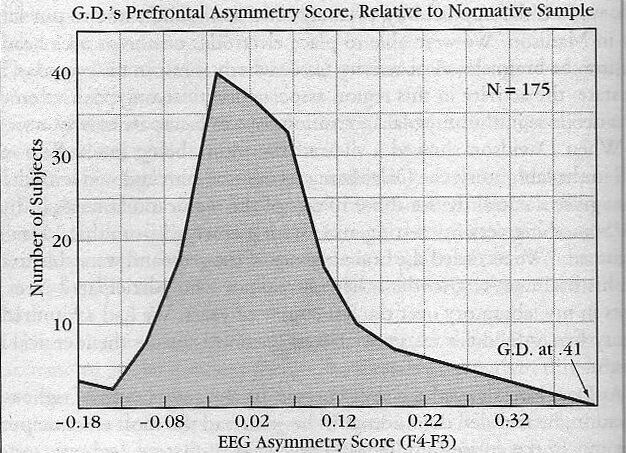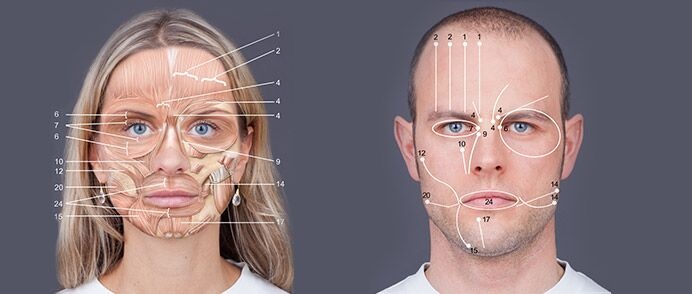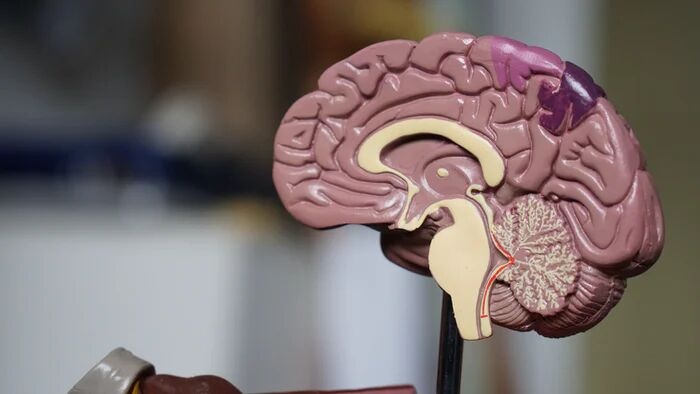
You probably have a friend or two that constantly boasts about the benefits of meditation. It turns out they aren’t exaggerating - meditation has been scientifically proven to have some incredible superhuman benefits.
Meditation is so powerful that the mind of a meditator works totally differently from anyone else’s. The Dalai Lama proved this when he gave scientists his right-hand man, Lama Oser to a study. The European monk had over 30 years of meditative experience. The scientists tested him on various parameters, and this is when we discovered the magical benefits of meditation.

Left to Right
This fact is literally proof that meditation can bring you insane equanimity and wellbeing. Scientists tested this by checking out Lama Oser’s left-to-right prefrontal cortex activity ratio. It is believed that people who are happier have a higher left-to-right ratio in terms of brain activity. A higher left-to-right ratio can also indicate how quickly you recover from stress.
Oser’s ratio was measured with an MRI scanner and compared to a sample of 175 other people. His left-to-right ratio was so high compared to others that it was almost off the chart!

Mastering Body Language
Paul Elkman, the lead character in the TV show “Lie To Me,” is responsible for revolutionizing the way we understand emotions and facial expressions. He discovered micro-expressions, which are fleeting millisecond expressions that are said to reveal our true emotions.
FBI agents and clinical psychologists are known to be masters at detecting micro-expressions because of their line of work. However, when Elkman tested Lama Oser’s ability to detect these subtle expressions, he was better than them all. In fact, his body language expertise was the best Elkman had ever recorded!

Empathy
You may be under the impression that empathic intelligence is a personality trait that you are just born with: either you have it, or you don’t. However, that may not always be the case. In fact, Lama Oser may act as an example that empathy can actually be taught with years of mindfulness practice.
The ability to recognize other people’s emotions is highly associated with empathy. So if Lama Oser was the best at detecting micro-expressions, it also meant that by default he had more empathy than any other person that was in that study.

Freaky Fast
With that being said, even the most empathetic person on the planet would not be able to notice these super-fast micro-expressions. Recognizing these expressions also takes an extremely sharp, focused, and quick mind. That’s because these micro-expressions sometimes last only a hundredth of a second, and your brain would have to keep up by catching and processing these expressions just as fast.
Lama Oser had super fast cognitive functioning that was able to detect these movements faster than anyone who had ever been tested.

Surprise
Have you ever jumped when hearing a loud banging sound? Or when someone surprises you out of nowhere? That is called the startle response, and Paul Ekman has dedicated years of his life studying this. Ekman has found that almost every single person has some sort of response. Even the most capable policemen and policewomen have one. They blink slightly every time the gun goes off, even though they practice shooting all the time.
Lama Oser was the first person that has ever been able to suppress his startle response. When he is meditating, he is so focused that nothing startles him at all.

Peacemaker
Practicing meditation not only made Lama Oser a unique person, but it also affected all of the people around him. This was proven when a very special study was conducted on Oser. In this experiment, they had him sit down with an extremely contentious, harsh, and intolerant scientist. Oser’s goal was to discuss controversial issues with the scientist.
Here’s what the typically angry scientist had to say after their discussion: “I couldn’t be confrontational. I was always met with reason and smiles. It’s overwhelming. I felt something like a shadow or aura and I couldn’t be aggressive.”

Anxiety Fighter
Scientist Jon Kabat-Zinn decided to conduct a study in 2003 that would eventually redefine the way we look at meditation. In this experiment, a group of people did an eight-week long meditation program where they studied meditation, yoga, and mindful breathing.
In just eight weeks, the participants of the program achieved significant mental and physical changes. One of the main factors was a major decrease in anxiety levels compared to those who did not participate in the study.

No More Negativity
Jon Kabat-Zinn reached a few groundbreaking conclusions as a result of this legendary study. Not only did he figure out that those who participated in the meditation course had lowered anxiety levels, but he also learned that those who meditated actually had a better mood. That’s right - meditation actually made them happier than they were before.
He scanned the participant’s brains and, just like Lama Oser’s brain, their left-to-right prefrontal cortex ratio had changed dramatically. The participants’ positive emotions increased and their negative thoughts decreased.

Immune Health
Another revolutionary discovery from the 2003 Kabat-Zinn University of Wisconsin study was that they were able to prove that the benefits of meditation were not just psychological, but physical as well.
Kabat-Zinn injected into the participants of the study a mild cold virus to see how their immune system would respond. Those who entered the meditation course had a stronger immune response and recovered faster than the control group that did not meditate. This was enough to get the attention of the science community.

Good Choice
Imagine you are betting money on a slot machine and allowing yourself to spend no more than $50. However, after just spending your fiftieth dollar, you decide to spend another to at least recoup your losses.
This type of thinking, known as a sunk-cost fallacy, is irrational and is the reason gamblers often go broke. Luckily, we can get around this poor decision making. With just a fifteen-minute meditation session, we can force our brains to make smarter, more rational decisions. By bringing our attention to the present moment, we avoid dwelling on past events that can distort our decision-making process.

Fighting Neurodegenerative Diseases
Scientists and doctors have spent decades upon decades trying to figure out ways to slow down neurodegenerative diseases such as Alzheimer’s disease. It turns out that meditation may play an important role in slowing the progression of age-related cognitive disorders.
After an 8-week mindfulness-based stress reduction program conducted by researchers at the Beth Israel Deaconess Medical Center, Alzheimer’s patients who took part in the program showed less cognitive decline than the control group. Those who participated also reported higher levels of happiness and wellbeing.

Creative Mind
The two main foundations of creativity consist of divergent thinking - which means coming up with lots of ideas, and convergent thinking - which means solidifying those ideas until one “aha moment.”
In a study performed by cognitive psychologist Lorenza Colzato, it was concluded that meditation improved both convergent and divergent thinking. Interestingly enough, the type of meditation that was done had an effect on which type of thinking was most improved, but all types led to impressive results. Free-association meditation improved divergent thinking, while focused-attention meditation improved convergent thinking.

Time to Focus
When it comes to the benefits of meditation in the realm of education, the possibilities are endless. George Mason University professor Robert Youmans and University of Illinois Ph.D. student Jared Ramsburg proved meditation’s influence on accelerated learning in a shocking controlled study.
They asked a selection of students to meditate before a lecture and compared their test results with a group that did not meditate. Meditation helped students focus and retain the lecture information much better than the control group did.

Blood Pressure Benefits
In this case, meditation proves once again that it has magical powers that help the entire human body.
About 1 in 3 Americans suffer from high blood pressure. High blood pressure can be dangerous and increases one’s chances of developing congestive heart failure, kidney disease, heart disease, and stroke. In a study by the University of Kentucky, it was proven that the use of transcendental Meditation (repeating a mantra) significantly lowered high blood pressure. It was so helpful that it was basically the equivalent of adding a second antihypertensive agent to one’s routine - but without the nasty side effects.

Attention Please
Meditation may seem easy at a first glance, but focusing on one thing for a certain amount of time is much harder than it sounds. After all, there is a reason why Buddhists call meditation “training of the mind.”
In an experiment of 60 participants, researchers had one group go on a three-month meditation retreat, while the others stayed at home. The ones who attended the retreat showed impressive improvements on a 30-minute attention test compared to those who did not meditate. This shows us that meditation can help improve your ability to concentrate and hold your attention.

Lonely Boy
Feelings of loneliness and social isolation can affect anyone, and its consequences can be quite damaging. These feelings can be detrimental to our physical and mental health.
In a study conducted by J. David Creswell of Carnegie Mellon University, it was found that just 30 minutes of meditation a day for eight weeks decreased feelings of loneliness significantly. The study also proved that meditation reduced the group’s risk of inflammatory diseases. Creswell mentioned the importance of consistency, saying “It’s important to train your mind like you train your biceps in the gym.”

Addicts
Combating negative habits and addiction is never easy. Some choose to use a side-on approach. For example, if someone wants to become more productive, strategic breaks instead of forcing yourself to work longer hours can be very effective.
This philosophy was put to the test during a study at the University of Oregon. The participants of the study were all people who were interested in reducing their stress levels, but in actuality, the experiment was designed to explore how meditation would impact smoking. The participants ended up curtailing their smoking by 60%.

The Power of Pain
People who meditate tend to have a much higher pain threshold than those who don’t.
A study at the University of Montreal tested the pain tolerances of 13 zen meditators compared to a control group of nonmeditators using a calibrated heated rod on their calves. The meditating group experienced an overall 18% less pain than the nonmeditators. A rather extreme example of this crazy-high pain threshold is a monk who did not scream or move during his self-immolation.

PTSD
People with post-traumatic stress disorder suffer from intense, disturbing feelings related to a stressful experience that lasts long after the traumatic event has ended. These feelings can be crippling, but fortunately, meditation is here to save the way.
A study from the University of Michigan Health System and the Veteran’s Association Ann Arbor Healthcare System shows that veterans with PTSD who completed a two-month-long mindfulness program had significant improvements in their PTSD symptoms compared to those who did not meditate.

Sleepy Time
Insomnia is a very common yet difficult sleep disorder that makes it hard for you to fall asleep or stay asleep. Many people turn to medication to help treat this disorder, but breathing and relaxation techniques have been proven to be incredibly effective as well.
In a sleep study performed on 11 insomniac patients, meditation performed during the day was shown to improve their quality of sleep. Conditions like sleep latency, total wake time, sleep quality and sleep efficiency were all improved in meditating patients.

Can You Hear Me Now?
Who would have thought that of all things, meditation can actually improve your hearing? Believe it or not, a study conducted at the University of Oregon in 2013 proved this to be true.
Music students were given a short guided meditation before listening to an opera. Their peak experiences and “flow” were compared to a group that did not meditate beforehand. Out of the 69 subjects in this study, 64% of them thought that the meditation technique had enhanced their listening experience.

Photographic Memory
When we first take a look at an object, our brain can only retain the image for a few seconds. That’s why when you’re painting a picture of something, you have to constantly look back and forth at what you’re drawing. However, some monks claim to be able to hold images in their heads for extended periods of time.
In a 2009 study, those who meditated had significant improvements in their visual memory. More research needs to be carried out on how exactly this works, but it’s pretty amazing how much meditation can affect memory.

Karuna
The Buddhist word for compassion, "karuna," has a very special meaning. It means having compassion not only for others but for yourself as well. The Dalai Lama decided that it was impossible to be truly compassionate toward others if they didn’t first feel compassionate toward themselves.
Compassion is an essential component of happiness and self-esteem. Luckily, we can become more compassionate by meditating. A Northeastern University College of Science showed that meditating made the participants 50% more compassionate.

Turn Down the Distractions
Distractions are a part of life. But if you find yourself easily distracted by trivial things and it is affecting your work, you might want to give meditation a try. Meditating will help you focus your attention and zone out various stimuli.
In a study conducted by Massachusetts General Hospital, Harvard Medical School, and the Massachusetts Institute of Technology, scientists concluded that meditation helps increase alpha waves in the brain. These waves turn down the volume of distracting information.

The Iceman
The autonomic nervous system is the part of your brain that you don’t control - it’s responsible for processes like digestion and supplying the internal organs with blood.
Wim Hof, a man who has spent years of his life meditating, is the only person to ever show some sort of control over their autonomic nervous system. He can withstand cold temperatures that would kill an ordinary person. When Hof is asked about his superhuman abilities, he claims that it is all thanks to his regular meditation practices.

Meditating for a Flawless Face
Would you believe it if we told you that practicing meditation on a regular basis leads to clearer skin? It’s true!
Acne can occur as a result of a number of factors including diet, poor hygiene, and genetics. But one of the biggest causes of acne is stress. We all know that meditation is one of the most effective ways of reducing stress and anxiety levels. Therefore, it can indirectly help promote clear, flawless skin.
















